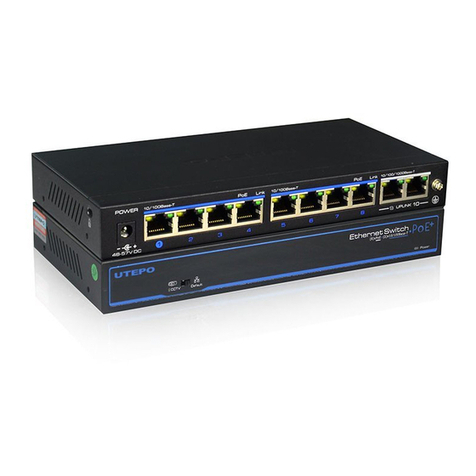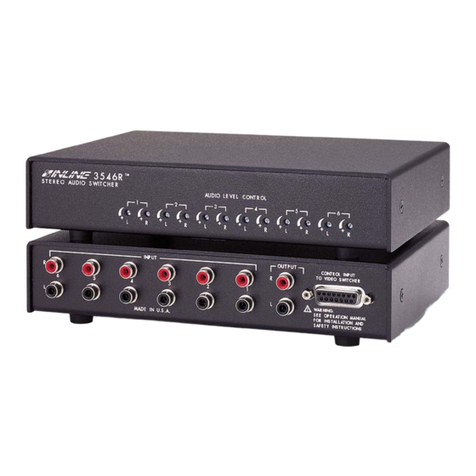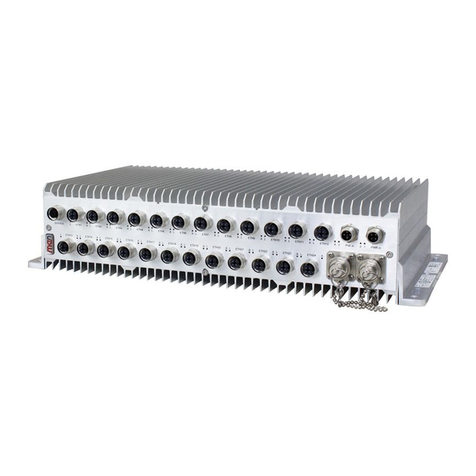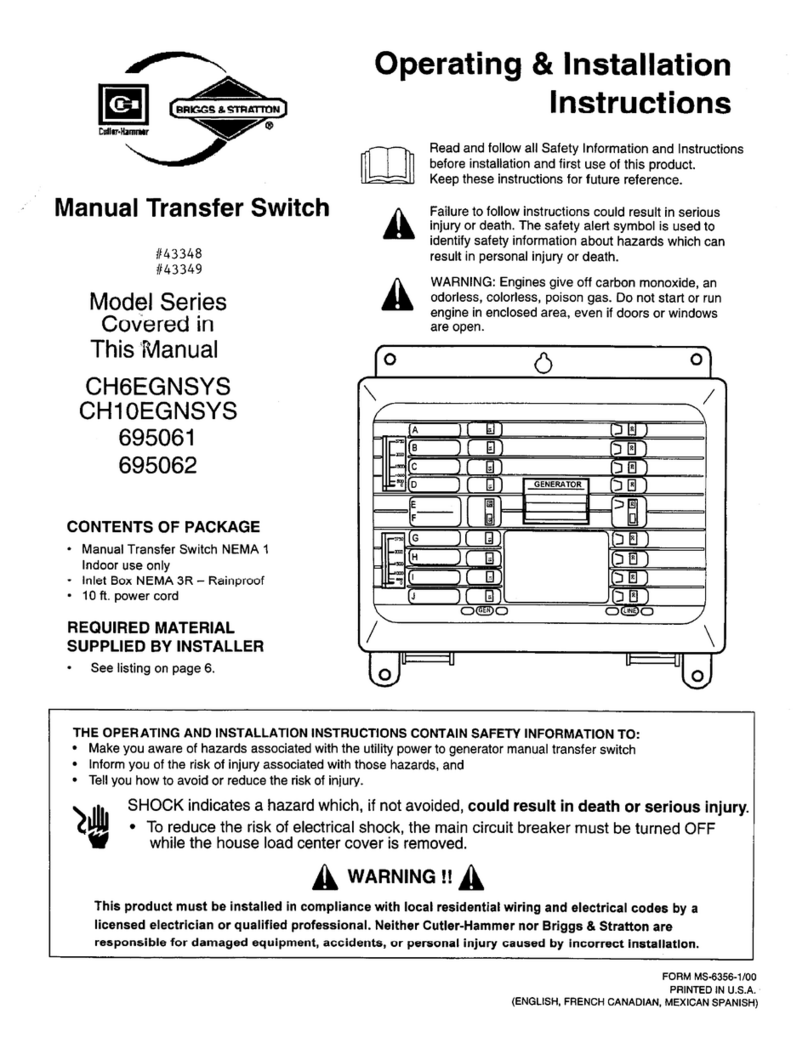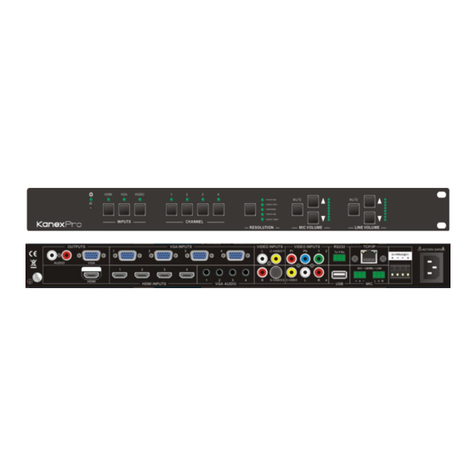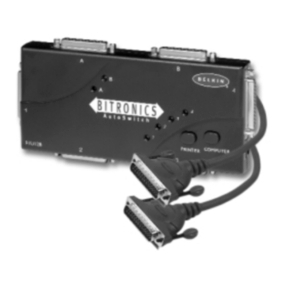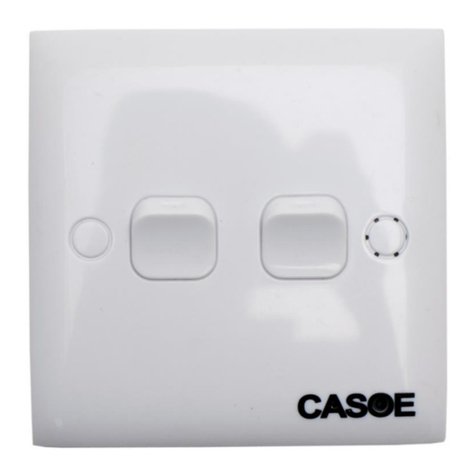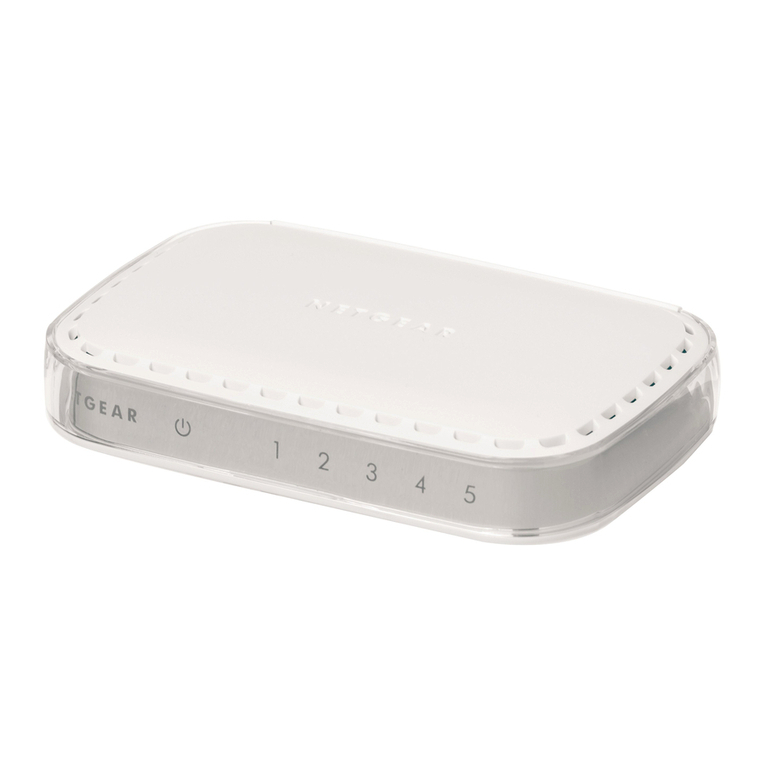PowerWalker Automatic Transfer Switch User manual

EN
Automatic Transfer Switch
(ATS)
Quick Start Guide

EN
1. Introduction
This ATS product is designed with two independent power inlets to supply power to the load from
a primary power source. Should primary power source fail, the secondary will automatically back
up the connected equipment without any interruption. The transfer time from one line to another
is seamless to the connected equipment. After switching to a secondary power source, the ATS can
also switch power back to the primary input when power to the primary input is restored.
Package contents:
ATS module
User manual
mounting brackets
2. Product Overview
Front View:
Power switch for input source A
Power switch for input source B
Circuit breaker for output 2
Circuit breaker for output 3
USB communication port
RS-232 communication port
Communication slot
Operation indicators (please refer to section 4 for the details)
Back View
Contact port (please refer to section 7 for the details)
Output receptacles “Output 3”(IEC 10A)
Output receptacles “Output 2”(IEC 10A)
Output receptacle “Output 1”(IEC 16A)
Input source A connector
Input source B connector

EN
3. Important Safety Warnings
Before using the unit, please read all instructions and cautionary markings on the unit, this
manual and the batteries.
WARNING!! The ATS must be connected to earth when in use.
In line with current regulations, only use the cables that have been supplied with the machine. The
power supply socket must be easily accessible to the operator.
WARNING!! The ATS has been designed exclusively to operate indoors. It is advisable to install it in
areas where no inflammable liquids or gases, or other harmful or noxious substances, have been
stored.
ATTENTION!! A soft damp cloth may be used to clean the outside of the machine (always with the
system disconnected from the mains power supply and users).
Do not use any type of solvent as this may damage the external finishing of the machine.
ATTENTION!! The ATS has been designed exclusively for professional use.
NOTE: These instructions may be modified by the wiring regulations in force in the country where
the ATS is purchased.
4. Operation Indicators & Status
Source preference selector
Priority setting LEDs
Power source status LEDs
Output source LEDs
Fault indicator
Alarm mute button

EN
Indication
type
LED description
LED status
Condition
Alarm
Priority
setting LEDs
Source A ()
ON
Source A is priority
OFF
Source B ()
OFF
Source A ()
OFF
Source B is priority
OFF
Source B ()
ON
Power source
status
Status of source A
()
OFF
Inlet A has no power input
OFF
ON
Inlet A has power input, and power is
OK
OFF
Flashing
Inlet A has power input, but power is
out of SPEC
OFF
Status of source B
()
OFF
Inlet B has no power input
OFF
ON
Inlet B has power, and power is OK
OFF
Flashing
Inlet B has power input, but power is
out of SPEC
OFF
Output status
Output from
source A ()
ON
Power A is output
OFF
Output from
source B ()
OFF
Output from
source A ()
OFF
Power B is output
OFF
Output from
source B ()
ON
Output from
source A ()
OFF
NO OUTPUT
OFF
Output from
source B ()
OFF
Alarm
Fault ()
OFF
Alarm not present
OFF
ON
Alarm present
Continuously

EN
5. Installation
NOTE: Before installation, please inspect the unit. Be sure that nothing
inside the package is damaged.
Mounting the Unit
The unit can be mounted in a standard 19" rack. Fasten the mounting brackets to the unit using the
screws provided. With brackets attached securely, users can mount the unit in a standard 19" rack
as shown below.
NOTE: If the temperature around the unit will rise above 40 °C, ventilation is required
Connecting the Unit
For connecting the ATS, plug “input source A connector” and “input source B connector” to the
two independent power sources or UPSs depending using the SCHUCKO-IEC or IEC-IEC 16A cables
supplied.
Plug the user load to the output 10A (“Output 1 and 2”) or 16A (“Output 3”) sockets depending on
user’s requirements.

EN
6. Operation
Power On/Off
Put the input power switch in “ON” position. The output will then be supplied by the source set as
selected.
Setting priority of power source
It is possible to set the power source preference to supply the output by pushing the button of
“source preference selector”. The default power source is “Source A”.
Function
Description
Default
Possible configuration
Source perference
selector
Selection of input that normally
supplies the load
Source A
Source A
Source B
7. Communication Port
The ATS is supplied with the following communication ports:
Serial port is available with RS232 com. port and USB com. port on the front panel.
NOTE: the use of one port automatically excludes the other.
Contacts port on the rear panel.
Serial Ports: RS-232 & USB connectors
RS-232 connector USB connector
PIN #
NAME
TYPE
SIGNAL
PIN #
SIGNAL
1
1
VBUS
2
TX
OUT
Serial line TX
2
D-
3
RX
IN
Serial line RX
3
D+
4
4
GND
5
GND
POWER
6
+12V
POWER
7
8
9
NOTE: The utilization of the communication port is optional and it is not necessary for the correct
functioning of the ATS.

EN
Contact Ports
The contacts port is formed using six (6) pins numbered from left to right (see fig. 1), which can be
connected to an external monitoring system (such as a BMS) in order to monitor the operational
status of the ATS.
The external equipment must respect the voltage and current characteristics of contacts port.
Fig. 1: Focus on contacts port.
The contacts port provides the following pins:
Pin 1: common contact.
Pin 2: “Source B” active contact (if the contact between “pin 1” and “pin 2” is closed, output is
supplied by “Source B”).
Pin 3: “Source A” active contact (if the contact between “pin 3” and “pin 1” is closed, output is
supplied by “Source A”).
Pin 4: “Source A” status OK contact (if the contact between “pin 4” and “pin 1” is closed,
“Source A” is present and regular).
Pin 5: “Source B” status OK contact (if the contact between “pin 5” and “pin 1” is closed,
“Source B” is present and regular).
Pin 6: Status OK contact (if the contact between “pin 6” and “pin 1” is closed, ATS functioning
status is regular).
The following diagram shows the functioning of the contacts port.
Fig. 2: Contacts port basic diagram.
ATTENTION: The pins of the contact port are able to carry maximum current of 8A and maximum
voltage of 250Vac.

EN
8. Trouble Shooting
Use the table below to solve minor problems.
Problem
Possible Cause
Solution
The ATS with the
mains voltage
present, does don’t
turn on.
(The LEDs does not
flash and no alarm
sounds.)
No connection with
input plugs
Connect the mains to the input plugs as
indicated in the installation section.
Input switch in “OFF”
position
Turn the input switches in “ON” position.
Input power failure
Check that the mains voltage is present or
check if the UPS supplying the ATS is
powered on.
Protective device
upstream activated
Reset the protective device. Warning:
check that there is no overload or short-
circuit at the output of the UPS.
The load is not
powered.
No connection with
output sockets
Connect the load to the output sockets
Intervention of 10A
thermal protection
The thermal protection device will
operate in the event of a short circuit or
overload on one of the 10A output
sockets. The thermal protection can be
reset by pushing the button in which will
result in the power being reconnected to
the load. Therefore prior to attempting a
reset of the thermal protection, please
check the connected loads rating and/or
determine if there are any problems.
Then once reset, reconnect each load one
at a time to ensure no problems exists.
The display shows
nothing or provides
incorrect
information.
There is power supply
problem in display.
Shut down the ATS completely and wait
for a few seconds.
Switch the ATS on again, if the problem
persists, contact the nearest technical
support centre.
The display is off but
the load is powered.
There is power supply
problem in display.
Contact the nearest technical support
centre.
If there is any abnormal situations occur, which doesn't list above, please call the service people
immediately for professional examine.

EN
9. Specifications
MODEL
ATS
INPUT
Input Voltage
220/230/240 VAC
Acceptable Input Voltage Range
180 - 258 VAC
Input Frequency
50 Hz/60 Hz
Maximum Input Current
16 A
OUTPUT
Output Voltage
220/230/240 VAC
Maximum Output Current
10 A for IEC-C13 outlets
16 A for IEC-C19 outlet
CONNECTION
Input
2 x IEC-C20 inlets
Output
8 x IEC-C13
1 x IEC-C19
Communication
USB/RS-232
TRANSFER TIME
9-12ms (Typical)
PHYSICAL
Dimension, D X W X H (mm)
330 X 483 X 44
Net Weight (kgs)
5.0
ENVIRONMENT
Operating Temperature
0-95 % RH @ -5°C- 45°C (non-condensing)

EN
10. Appendix:
Input Voltage and Frequency Thresholds
FUNCTION
DESCRIPTION
DEFAULT
SETTING
Acceptable input voltage
range for Source A
Source A will be power source during this
range. When input voltage of source A is
beyond this range, ATS will automatically
switch to power from Source B.
180V –258V
Return voltage point for
Source A
When input voltage of Source A is back to
normal, the ATS will switch back to Source
A. (Setting Source A as priority power
source and Source B is powering)
Low point: 190V
High point: 248V
Acceptable input voltage
range for Source B
Source B will be power source during this
range. When input voltage of source B is
beyond this range, ATS will automatically
switch to power from Source A.
180V –258V
Return voltage point for
Source A
When input voltage of Source B is back to
normal, the ATS will switch back to Source
B. (Setting Source B as priority power source
and Source A is powering)
Low point: 190V
High point: 248V
Acceptable input
frequency for Source A
Source A will be power source during this
range. When input frequency of source A is
beyond this range, ATS will automatically
switch to power from Source B.
45Hz –55Hz
Acceptable input
frequency for Source B
Source B will be power source during this
range. When input frequency of source B is
beyond this range, ATS will automatically
switch to power from Source A.
45Hz –55Hz
Table of contents
Popular Switch manuals by other brands
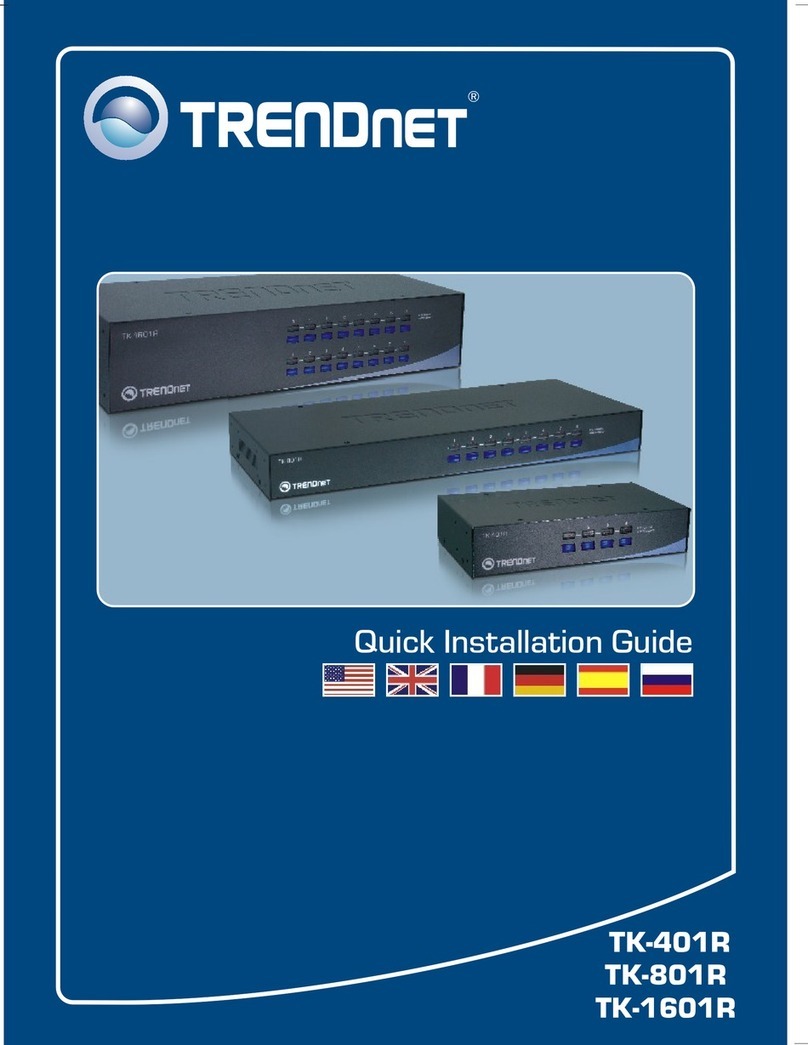
TRENDnet
TRENDnet TK-401R null
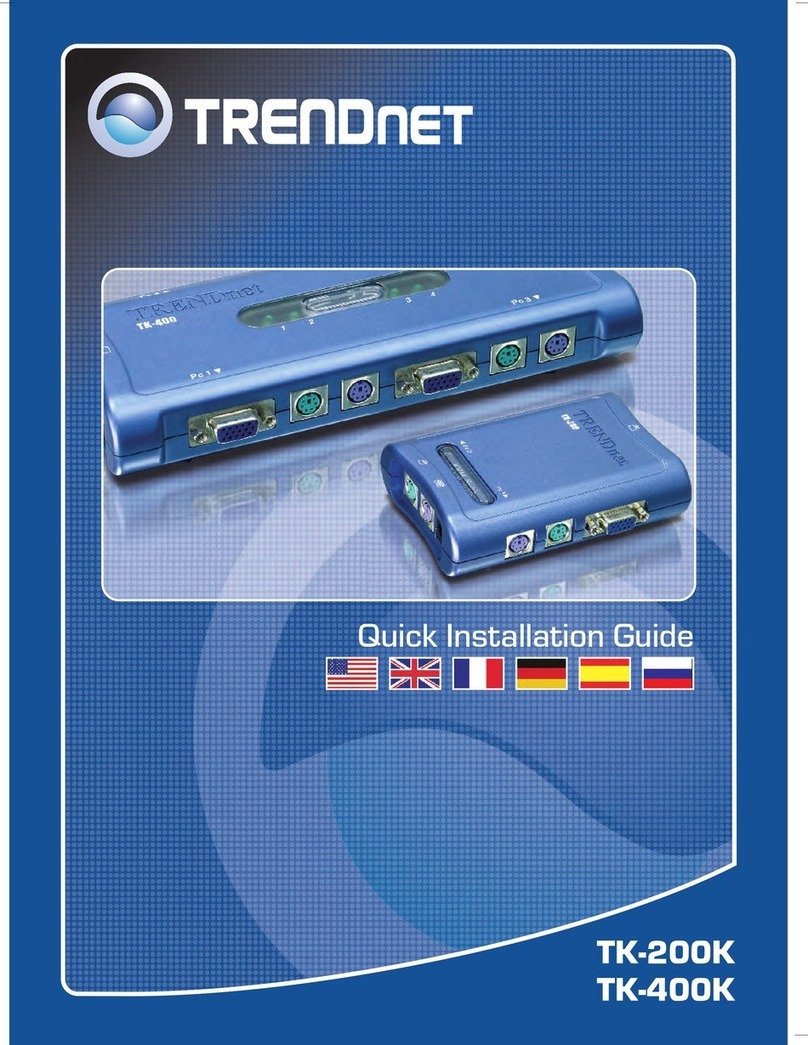
TRENDnet
TRENDnet TK-200K null
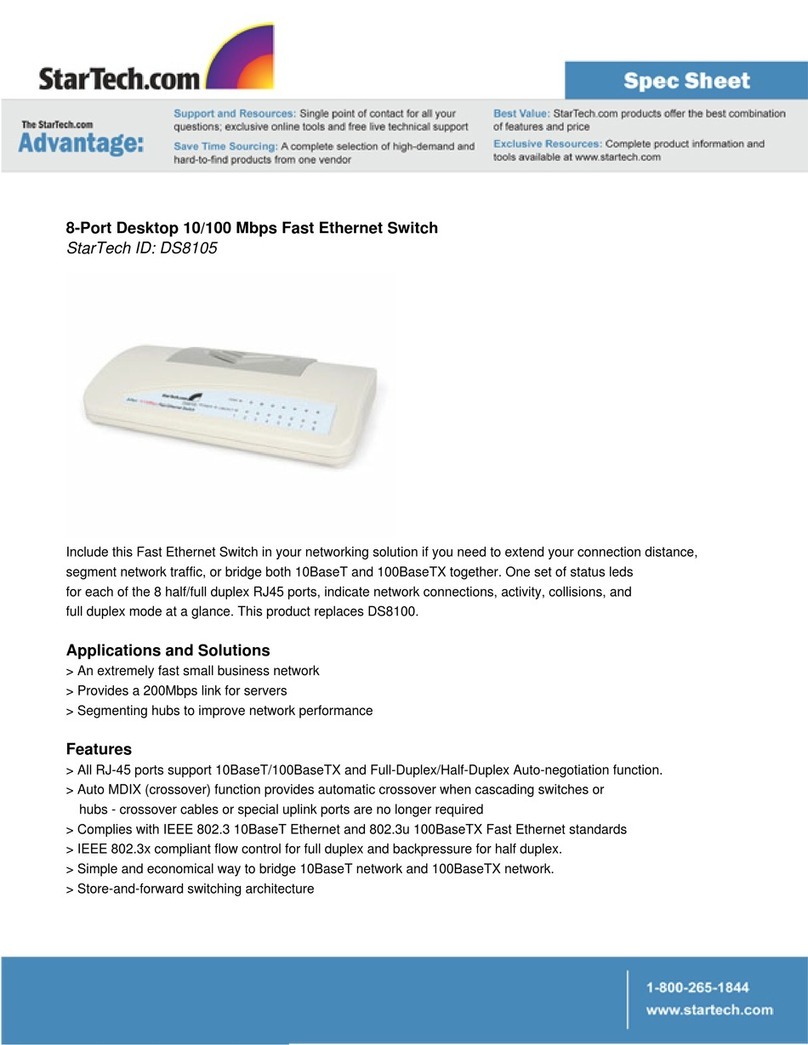
StarTech.com
StarTech.com DS8105 Spec sheet
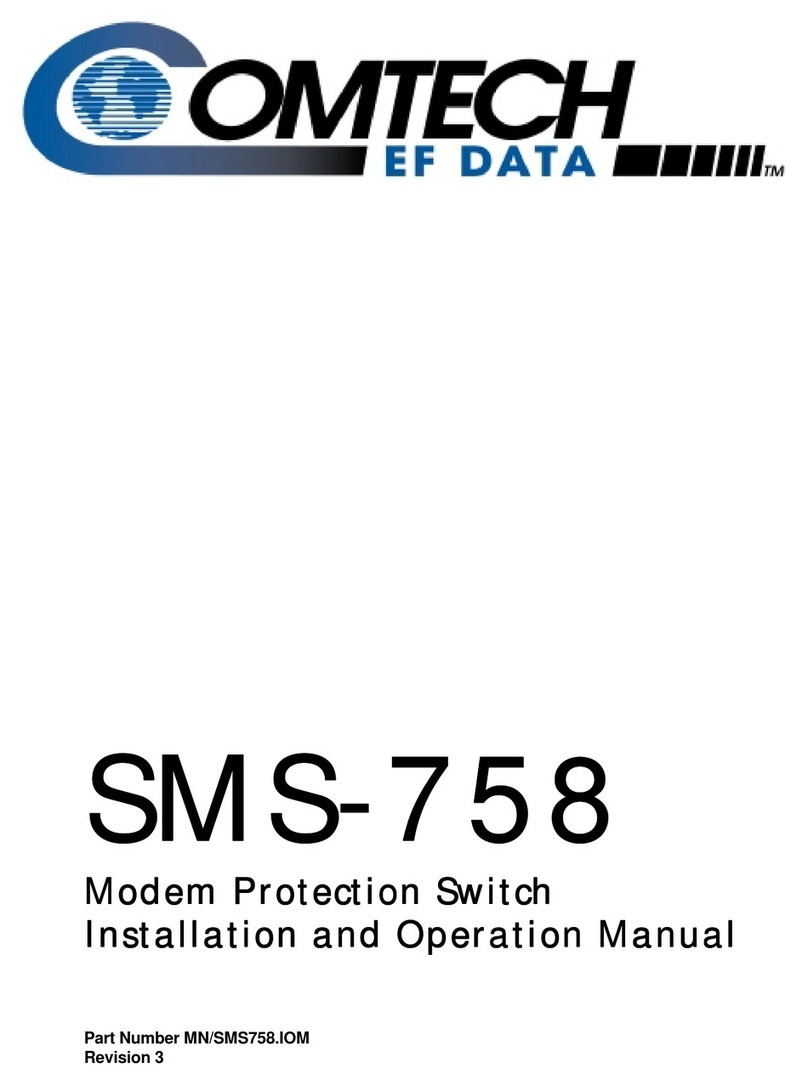
Comtech EF Data
Comtech EF Data SMS-758 Installation and operation manual
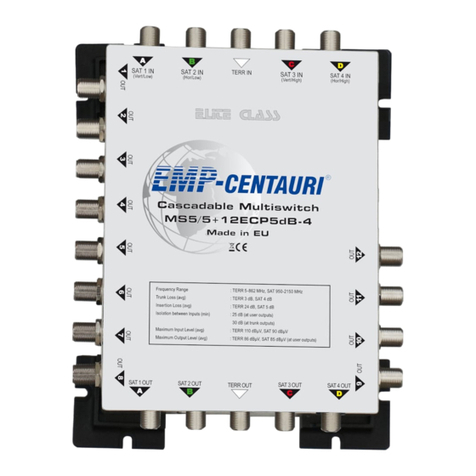
EMP-Centauri
EMP-Centauri MS5/5+12ECP5dB-4 instruction manual
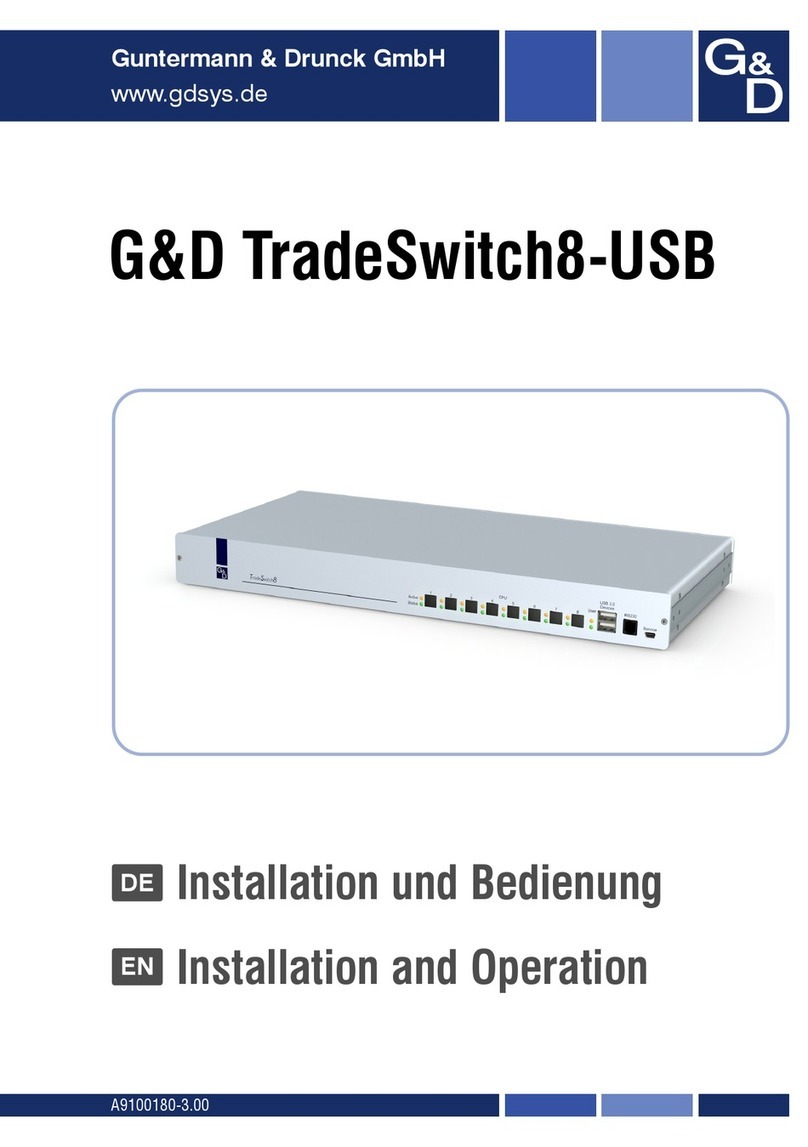
Guntermann & Drunck
Guntermann & Drunck TradeSwitch8-USB Installation and operation manual
